After Heidegger?
New Heidegger Research
Series Editors:
Gregory Fried, Professor of Philosophy, Suffolk University, USA
Richard Polt, Professor of Philosophy, Xavier University, USA
The New Heidegger Research series promotes informed and critical dialogue that breaks new philosophical ground by taking into account the full range of Heideggers thought, as well as the enduring questions raised by his work.
Titles in the Series:
After the Greeks, Laurence Paul Hemming (forthcoming)
After Heidegger?, edited by Gregory Fried and Richard Polt
Correspondence 19491975, Martin Heidegger, Ernst Jnger, translated by Timothy Quinn
Existential Medicine: Essays on Health and Illness, edited by Kevin A. Aho (forthcoming)
Heidegger and the Environment, Casey Rentmeester
Heidegger and the Global Age, edited by Antonio Cerella and Louiza Odysseos
Heidegger in the Islamicate World, edited by Kata Moser and Urs Gsken (forthcoming)
Heidegger and Jewish Thought, edited by Micha Brumlik and Elad Lapidot (forthcoming)
Heidegger in Russia and Eastern Europe, edited by Jeff Love
Heideggers Gods, Susanne Claxton
Making Sense of Heidegger, Thomas Sheehan
Proto-Phenomenology and the Nature of Language, Lawrence J. Hatab
The Question Concerning the Thing: On Kants Doctrine of the Transcendental Principles, Martin Heidegger, translated by Benjamin D. Crowe and James D. Reid (forthcoming)
Published by Rowman & Littlefield International Ltd
Unit A, Whitacre Mews, 2634 Stannary Street, London SE11 4AB
www.rowmaninternational.com
Rowman & Littlefield International Ltd. is an affiliate of Rowman & Littlefield
4501 Forbes Boulevard, Suite 200, Lanham, Maryland 20706, USA
With additional offices in Boulder, New York, Toronto (Canada), and Plymouth (UK)
www.rowman.com
Copyright 2018 Gregory Fried and Richard Polt
Copyright in individual chapters is held by the respective chapter authors.
All rights reserved. No part of this book may be reproduced in any form or by any electronic or mechanical means, including information storage and retrieval systems, without written permission from the publisher, except by a reviewer who may quote passages in a review.
British Library Cataloguing in Publication Data
A catalogue record for this book is available from the British Library
ISBN:HB 978-1-7866-0485-9
PB 978-1-7866-0486-6
Library of Congress Cataloging-in-Publication Data is Available
ISBN 978-1-78660-485-9 (cloth: alk. paper)
ISBN 978-1-78660-486-6 (pbk: alk. paper)
ISBN 978-1-78660-487-3 (electronic)
 The paper used in this publication meets the minimum requirements of American National Standard for Information SciencesPermanence of Paper for Printed Library Materials, ANSI/NISO Z39.481992.
The paper used in this publication meets the minimum requirements of American National Standard for Information SciencesPermanence of Paper for Printed Library Materials, ANSI/NISO Z39.481992.
Printed in the United States of America
Abbreviations
The following abbreviations for texts by Heidegger are used in this volume. When both a German text and a translation are cited, the German pagination is followed by a slash and the English pagination. When no translation is cited, any translation is the authors own. The abbreviation tm indicates that a translation has been modified, and em indicates that emphasis has been modified.
BEING AND TIME
- SZ = Sein und Zeit. Tbingen: Niemeyer, 1953. Later editions share the same pagination, which is also provided in the English translations and in the Gesamtausgabe edition (GA 2). The first edition was published in 1927.
- MR = Being and Time. Tr. John Macquarrie and Edward Robinson. New York: Harper & Row, 1962.
- SS = Being and Time. Tr. Joan Stambaugh, revised by Dennis J. Schmidt. Albany: State University of New York Press, 2010.
GA = GESAMTAUSGABE
All volumes of Heideggers Gesamtausgabe are published in Frankfurt am Main by Vittorio Klostermann. The date of publication, or dates if there is more than one edition, is followed by the date of original composition in parentheses. A translation is listed when available.
- GA 1 = Frhe Schriften. Ed. Friedrich-Wilhelm von Herrmann. 1978 (19121916).
- GA 3 = Kant und das Problem der Metaphysik. Ed. Friedrich-Wilhelm von Herrmann. 1991, 2010 (1929)./Kant and the Problem of Metaphysics. 5th ed. Tr. Richard Taft. Bloomington: Indiana University Press, 1997.
- GA 4 = Erluterungen zu Hlderlins Dichtung. Ed. Friedrich-Wilhelm von Herrmann. 1981, 2012 (19361968)./Elucidations of Hlderlins Poetry. Tr. Keith Hoeller. Amherst, NY: Humanity Books, 2000.
- GA 5 = Holzwege. Ed. Friedrich-Wilhelm von Hermann. 1977 (19351946)./Off the Beaten Track. Tr. Julian Young and Kenneth Haynes. Cambridge: Cambridge University Press, 2002.
- GA 6.1 = Nietzsche I. Ed. Brigitte Schillbach. 1996 (19361939)./Nietzsche: Volumes I and II. Tr. David Farell Krell. New York: HarperOne, 1991.
- GA 7 = Vortrge und Aufstze. Ed. Friedrich-Wilhelm von Herrmann. 2000 (19361953).
- GA 8 = Was heit Denken? Ed. Paola-Ludovika Coriando. 2002 (19511952)./What is Called Thinking? Tr. J. Glenn Gray. New York: Harper & Row, 1968.
- GA 9 = Wegmarken. Ed. Friedrich-Wilhelm von Herrmann. 1976, 1996, 2004 (19191961)./Pathmarks. Ed. William McNeill. Cambridge: Cambridge University Press, 1998.
- GA 11 = Identitt und Differenz. Ed. Friedrich-Wilhelm von Herrmann. 2006 (19551963).
- GA 12 = Unterwegs zur Sprache. Ed. Friedrich-Wilhelm von Herrmann. 1985 (19501959)./On the Way to Language. Tr. Peter D. Hertz and Joan Stambaugh. New York: Harper & Row, 1971.
- GA 13 = Aus der Erfahrung des Denkens. Ed. Hermann Heidegger. 1983, 2002 (19101976).
- GA 14 = Zur Sache des Denkens. Ed. Friedrich-Wilhelm von Herrmann. 2007 (19271968)./Partial translation: On Time and Being. Tr. Joan Stambaugh. New York: Harper & Row, 1972.
- GA 15 = Seminare. Ed. Curd Ochwadt. 1986, 2005 (19511973)./Partial translation: Four Seminars. Tr. Andrew Mitchell and Franois Raffoul. Bloomington: Indiana University Press, 2003.
- GA 16 = Reden und andere Zeugnisse eines Lebensweges. Ed. Hermann Heidegger. 2000 (19101976).
- GA 17 = Einfhrung in die phnomenologische Forschung. Ed. Friedrich- Wilhelm von Herrmann. 1994, 2006 (19231924)./Introduction to Phenomenological Research. Tr. Daniel O. Dahlstrom. Bloomington: Indiana University Press, 2005.
- GA 18 = Grundbegriffe der aristotelischen Philosophie. Ed. Mark Michalski. 2002 (1924)./Basic Concepts of Aristotelian Philosophy. Tr. Robert D. Metcalf and Mark Basil Tanzer. Bloomington: Indiana University Press, 2009.
- GA 19 = Platon: Sophistes. Ed. Ingeborg Schler. 1992 (19241925)./Platos Sophist. Tr. Richard Rojcewicz and Andr Schuwer. Bloomington: Indiana University Press, 1997.
- GA 20 = Prolegomena zur Geschichte des Zeitbegriffs. Ed. Petra Jaeger. 1979, 1988, 1994 (1925)./History of the Concept of Time: Prolegomena. Tr. Theodore Kisiel. Bloomington: Indiana University Press, 1992.
- GA 21 = Logik. Die Frage nach der Wahrheit. Ed. Walter Biemel. 1976, 1995 (19251926)./Logic: The Question of Truth. Tr. Thomas Sheehan. Bloomington: Indiana University Press, 2010.

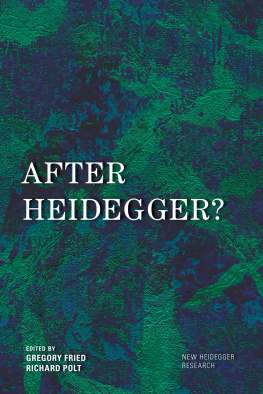
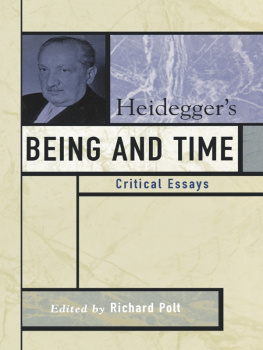

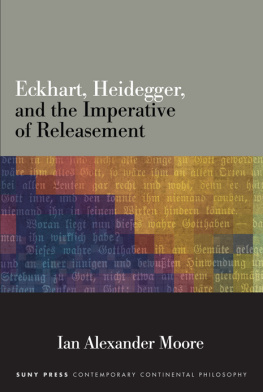
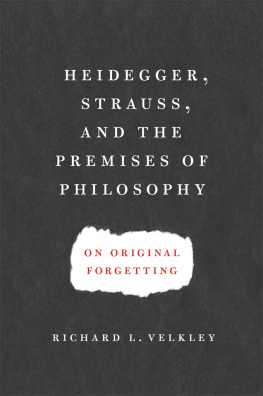
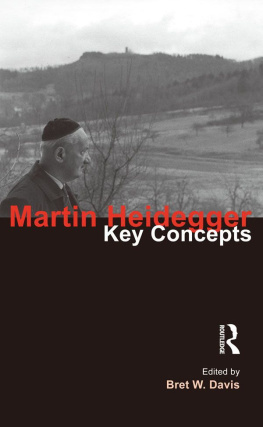
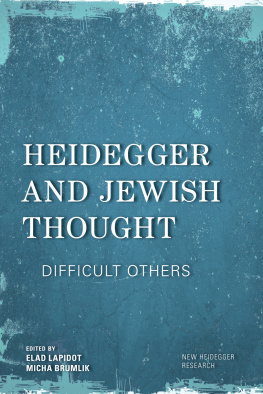
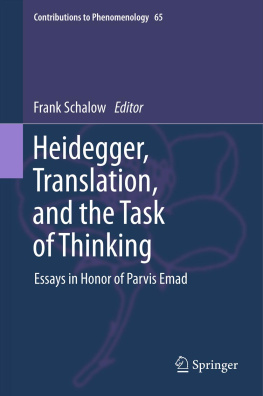
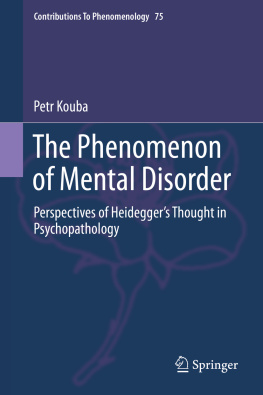


 The paper used in this publication meets the minimum requirements of American National Standard for Information SciencesPermanence of Paper for Printed Library Materials, ANSI/NISO Z39.481992.
The paper used in this publication meets the minimum requirements of American National Standard for Information SciencesPermanence of Paper for Printed Library Materials, ANSI/NISO Z39.481992.